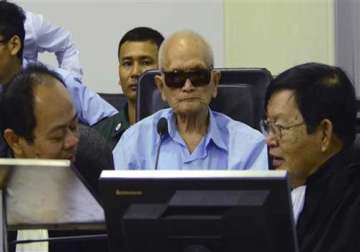Cambodian tribunal opens 1st genocide case
Phnom Penh, Cambodia: A U.N.-backed Cambodian tribunal began hearing the first genocide case against the country's brutal 1970s Khmer Rouge regime on Friday, another step toward justice for an estimated 1.7 million people who died
Phnom Penh, Cambodia: A U.N.-backed Cambodian tribunal began hearing the first genocide case against the country's brutal 1970s Khmer Rouge regime on Friday, another step toward justice for an estimated 1.7 million people who died from starvation, disease and execution.
Khieu Samphan, the regime's head of state, and Nuon Chea, right-hand man to the communist group's late leader, Pol Pot, already received life sentences in August after being found guilty of charges including crimes against humanity, related mostly to the group's forced movement of millions to the countryside when it took power in 1975. They have appealed their convictions.
The U.N.-backed tribunal split the cases into two trials for fear that Khieu Samphan, 83, and Nuon Chea, 88, could die before any proceedings against them could be completed.
The second trial also will include additional charges of crimes against humanity, addressing for the first time accusations of rape and forced marriages. The prosecutors made short opening statements Friday. The first witness is expected to testify on Monday.
According to the genocide charges, Pol Pot and other senior leaders intended to wipe out members of the country's Muslim Cham and Vietnamese ethnic minorities. Estimates of the number of Chams killed range from 90,000 to 500,000. Hundreds of thousands of ethnic Vietnamese were forced into neighboring Vietnam, and virtually all of those remaining were executed.
Vann Math, head of the Cambodia Islamic Association, said that the Khmer Rouge fiercely persecuted the Cham, destroying mosques and killing people. He said many Chams are now avidly following the tribunal's proceedings.
A Cham woman who attended a procedural hearing in July recalled the mortal danger of being a practicing Muslim under the rule of the Khmer Rouge, who sought to force them to abandon their religion.
“They killed many Muslim people,” survivor Simach Smam told The Associated Press. “They cooked pork and told us to eat it. If we didn't eat it, we would be killed. They would also kill us if they saw us praying to Allah. I am so full of anger.”
Lyma Nguyen, a lawyer representing ethnic Vietnamese victims, said outside the hearing that the trial represents not only a rare chance to shed light on the genocide, but also on the lingering harm the mayhem has caused to survivors.
Those forced to flee retained no documentation proving their Cambodian origins, so when they returned they were plunged into statelessness, and remain targets of widespread discrimination and political scapegoats.
Bopha Om, a 59-year-old woman who lost members of her family in the genocide, said she was forced into marriage under threat of death.
“The Khmer Rouge tortured me. They forced me to dig my own grave. So I want to see them being prosecuted in court,” she said.
After years of legal and political wrangling, the Khmer Rouge tribunal was established in 2006, but has been plagued by corruption, mismanagement, and financial woes.
The hybrid structure of the court, in which U.N.-appointed international judges and lawyers share duties with Cambodian counterparts, has led to allegations of political interference and repeated deadlocks.
In its first trial, the tribunal sentenced Kaing Guek Eav, also known as “Duch,” the director of the notorious S-21 torture center, to life imprisonment. The second trial, in which Khieu Samphan and Nuon Chea were convicted, opened in November 2011, but death and disability winnowed down the number of defendants.
Khmer Rouge Foreign Minister Ieng Sary died in March last year, and his wife Ieng Thirith, the regime's social affairs minister, was declared unfit for trial in September 2012 after being diagnosed with dementia. The group's top leader, Pol Pot, died in 1998.
“We want justice, and this justice is not even for us who have survived the Khmer Rouge genocide, but it is for our children and many generations to come.
This justice would help to prevent genocide to happen again here and elsewhere,” said Youk Chhang, head of the Documentation Center of Cambodia, which has collected more than a million documents related to the Khmer Rouge terror.
